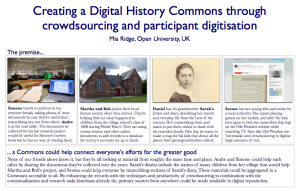A seriously incomplete retrospective of what I got up to in 2013… For PhD updates, check my PhD.
Highlights of the second half of 2013 included presenting at Speaking in Code at UVA’s Scholars’ Lab, organising the MCG’s Museums on the Web 2013 conference at Tate Modern with the Museums Computer Group, collaborating on 'Let’s Get Real’ with Culture24, the publication of two peer-reviewed articles – From Tagging to Theorizing: Deepening Engagement with Cultural Heritage through Crowdsourcing for Curator Journal and Creating Deep Maps and Spatial Narratives through Design with Don Lafreniere and Scott Nesbit for the International Journal of Humanities and Arts Computing, based on our work at the Summer 2012 NEH Advanced Institute on Spatial Narrative and Deep Maps: Explorations in the Spatial Humanities – and last but absolutely not least, creating Serendip-o-matic with 12 other wonderful digital scholars at the Roy Rosenzweig Center for History and New Media’s One Week | One Tool institute.)
In November 2013 I presented at Sustainable History: Ensuring today’s digital history survives and at the Herrenhausen Digital Humanities conference.
In July 2013 I chaired a session on Digital Transformations at the Open Culture 2013 conference in London on July 2, gave an invited lightning talk at the Digital Humanities Oxford Summer School 2013, ran a half-day workshop on Crowdsourcing at the Digital Humanities 2013 conference in Nebraska, and had an amazing time making what turned out to be Serendip-o-matic at One Week, One Tool in Virginia (my posts on the process).
In May 2013 I gave an online seminar on crowdsourcing (with a focus on how it might be used in teaching undergraduates wider skills) for the NITLE Shared Academics series. I gave a short paper on 'Digital participation and public engagement’ at the London Museums Group's 'Museums and Social Media’ at Tate Britain on May 24, and was in Belfast for the Museums Computer Group’s Spring meeting, 'Engaging Visitors Through Play' on May 30 and then Venice for a quick keynote (with Helen Weinstein) for the We Curate kick-off seminar at the start of June. I also gave another full-day workshop on Crowdsourcing at the British Library.
In April 2013 I gave a paper on my PhD research at Digital Impacts: Crowdsourcing in the Arts and Humanities, and a keynote on 'A Brief History of Open Cultural Data’ at GLAM-WIKI 2013 and did another workshop on 'Data Visualisation for Analysis in Scholarly Research' for the British Library’s Digital Scholarship Training Programme.
In March 2013 I was in the US for THATCamp Feminisms to do a workshop on Data visualisation as a gateway to programming and gave a paper on 'New Challenges in Digital History: Sharing Women’s History on Wikipedia' at 'Women’s History in the Digital World' at Bryn Mawr. My talk notes are posted on my blog as 'New challenges in digital history: sharing women’s history on Wikipedia – my draft talk notes’.
In February 2013 I gave a keynote on 'Crowd-sourcing as participation’ at iSay: Visitor-Generated Content in Heritage Institutions in Leicester and ran a workshop on 'Data visualisation for humanities researchers’ with Dr. Elton Barker for the CHASE 'Going Digital' doctoral training programme.
In January 2013 I taught all-day workshops on 'Data Visualisation for Analysis in Scholarly Research’ and 'Crowdsourcing in Libraries, Museums and Cultural Heritage Institutions’ for the British Library’s Digital Scholarship Training Programme.
